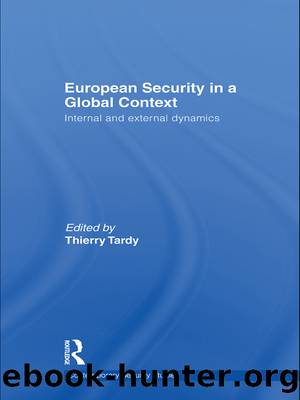European Security in a Global Context by Thierry Tardy

Author:Thierry Tardy [Tardy, Thierry]
Language: eng
Format: epub
ISBN: 9780415590778
Barnesnoble:
Publisher: Taylor & Francis
Published: 2010-06-10T00:00:00+00:00
The transatlantic strategic quandary
The strategic quandary is how to define a transatlantic future that both fits the security challenges of the present and allows for the greatest amount of flexibility for the future at a time of strategic uncertainty. Clearly, the transatlantic tie is today about choosing and advancing a strategic framework that meets the political and military requirements both within the region and elsewhere.
Alternative transatlantic frameworks: does Europe still matter?
Following in the lines of traditional transatlantic analysis, there are at least four alternative ways to define dominant transatlantic interactions in the longer-term future. First is a âtraditional modelâ â a combination of predominantly bilateral ties and NATO or NATO/EU dialogues within a strong commitment frameworkâthat would constitute the primary forum for the hammering out of transatlantic cooperation. Second, the âtransatlantic poolâ, favoured more often in the first Bush Administration, from which âcoalitions of the willingâ might be drawn on an ad hoc basis, with NATO assets as the âtoolboxâ to provide capabilities and support. Third, the âRiga networkâ, essentially as proposed by the Bush Administration at the Riga NATO Summit in 2006, would be a somewhat looser transatlantic alliance network linked through US leadership to cooperation with other like-minded states and groups throughout the world (e.g. Japan, Australia). Fourth, the âcore of a global coalition of democraciesâ, in which transatlantic identification and treaty arrangements would be decreasingly important and the global agenda for multilateral action in terms of common goals and values, more predominant.
The base assumptions of these models would be of continuing transatlantic consensus on the need for transparency and stability, on the values and goals that have served the West well, and the habit of continuing cooperation to mutual benefit. The choice would be about a framework and the form of political and military commitment. If sufficiently attractive, one of these alternatives might come to replace or enhance the scenarios of NATO or NATO/EU evolution that have characterised transatlantic debate since the end of the Cold War.1
Viewed in the context of a shooting war, and in the midst of the squabbles over rights and obligations, all but the first alternative seem somewhat academic or far-fetched. However, it is instructive to look at how different yet convergent some discussions of these alternatives on both sides of the Atlantic have been.
For a number of officials and strategists in the United States, and not just those close to the Bush Administration, it is hard to imagine that a version of alternative number one will be a primary cornerstone of American foreign policy in twenty or perhaps even ten years. A number of these actors see this as Americaâs âAsian centuryâ, dominated certainly in its first decades by the fast-moving political and military emergence of Asian powers, and most especially China and India, to levels matching their present economic prowess. Europe, they believe, is not central to facing these challenges, both because of its relative decline in power and resources but also because it has only secondary contributions to make to the American agenda.
Download
This site does not store any files on its server. We only index and link to content provided by other sites. Please contact the content providers to delete copyright contents if any and email us, we'll remove relevant links or contents immediately.
The European History Highway: A Guide to Internet Resources by Dennis A. Trinkle Scott A. Merriman(384)
European Security without the Soviet Union by Stuart Croft Phil Williams(380)
European Security in a Global Context by Thierry Tardy(343)
The Seven Wonders of the Ancient World by Michael Denis Higgins(312)
The Routledge companion to Christian ethics by D. Stephen Long Rebekah L. Miles(305)
Governance, Growth and Global Leadership by Espen Moe(279)
Gorbachev And His Generals by William C. Green(274)
Get Real with Storytime by Julie Dietzel-Glair & Marianne Crandall Follis(257)
Tibetan Studies in Comparative Perspective by Chih-yu Shih Yu-Wen Chen(248)
The Oxford History of the World by Fernández-Armesto Felipe;(236)
The Oxford Handbook of the Incas by Sonia Alconini(212)
Oral Poetry and Narratives from Central Arabia: The Poetry of Ad-Dindan : A Bedouin Bard in Southern Najd (Studies in Arabic Literature, Vol 17) (English and Arabic Edition) by P. M. Kupershoek P. Marcel Kurpershoek(206)
A Cultural History of Marriage in Antiquity by Karen Klaiber Hersch;(189)
The Hutchinson Dictionary of Ancient and Medieval Warfare by Peter Connolly John Gillingham John Lazenby(187)
The Egyptian Economy, 1952-2000 by Khalid Ikram(187)
How Languages Are Learned 5th Edition by Patsy M Lightbown;Nina Spada; & Nina Spada(180)
Europe Contested by Harold James(176)
CliffsNotes on Fitzgerald's The Great Gatsby by Kate Maurer(174)
India and the Silk Roads by Jagjeet Lally(159)
